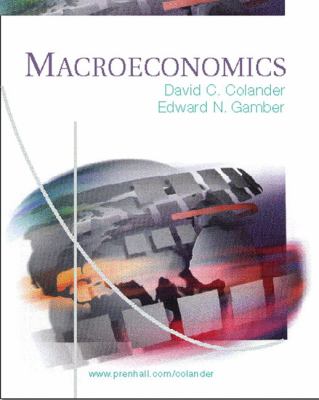135717
9780130303721
Macroeconomics
by Colander, David C., Gamber, Edward
Product details
- ISBN-13: 9780130303721
- ISBN: 0130303720
- Edition: 1
- Publisher: Prentice Hall PTR
AUTHOR
SUMMARY
We recently received a call from a reporter who asked us to rate macroeconomic forecasters. Given our reputations, the reporter was expecting a negative rating. We told him that macroeconomic forecasters beat back-of-the-envelope forecasting S to 10 percent of the time. He said, "You're really down on macro forecasters, aren't you?" "No, not at all!" we answered. "Given the complicated nature of the macro economy, that's a very impressive record--one that makes it worthwhile for firms and governments to employ economic forecasters." POLICY IN A COMPLEX ECONOMY The above story reveals this textbook's approach. We start from the assumption that the economy is a complex system. This means, among other things, that the relationships within the economy are constantly evolving, and that the degree of understanding that we can achieve through deductive models, starting from first principles, is limited. However, we do not teach students the science of complexity, or even introduce it. Studying how a butterfly flapping its wings in Australia affects weather patterns in Vermont is a subject matter for other courses. Our desire is to give students a general understanding of the ideas that guide macro policy, given the complex nature of the macro economy. Consistent with this view, we present macroeconomics as a set ofpolicy insightsembodied in simple models that policy makers use to reach decisions. If students want to understand recent debates about Fed policy or about the latest tax cut, they need to understand those macroeconomic models and the rules of thumb that underlie them. This emphasis on policy is central to our approach to teaching macroeconomics. We teach a policy course that does not require a deep understanding of formal theory but rather a practical type of knowledge--a good sense of terminology, data, institutions, and models. The models provide the frameworks within which macroeconomic policy discussions take place. This, we believe, is the essence of the intermediate macroeconomics course. With our primarily policy-oriented book, we provide frameworks for discussing complicated economic issues. We show how macroeconomists give pragmatic policy advice--based on a combination of models and a sense of history and institutions--that is useful but is far from perfect. MODELS AS WORKING TOOLS Consistent with the approach we've taken in this book, we do not present models as simplifications of the Truth, with a capital "T." Instead, we present them as working tools, which, when used with an educated common sense, a good understanding of relevant institutions, and insights gained from considering economic issues deductively, provide a reasonable set of guidelines for policy. We treat models as frameworks for organizing thoughts, not representations of the Truth. For example, Chapters 8 and 9 present the IS/LM model and encourage students to use it as an important first step to understanding the economy in the short run. But they also remind students that, like any model, the IS/LM model cannot fully capture the complexity of the economy. It simply provides an initial framework. This text provides the components necessary for using models right from the start. Instead of jumping directly into formal models, the first four chapters introduce students to the observed behavior and institutions of the economy, contemporary policy issues, and the short- and long-run frameworks that economists use to organize their thoughts about the economy. A MODERN ORGANIZATION We present growth and a discussion of the long run first, before the presentation of the short run. We do this not just because it is the modern approach; we do so because it makes sense. Over decades, long-run growth determines the wealth of nations. The study of growth and the long run gives students a sense of the power of markets, and provides a good starting point forColander, David C. is the author of 'Macroeconomics' with ISBN 9780130303721 and ISBN 0130303720.
[read more]



